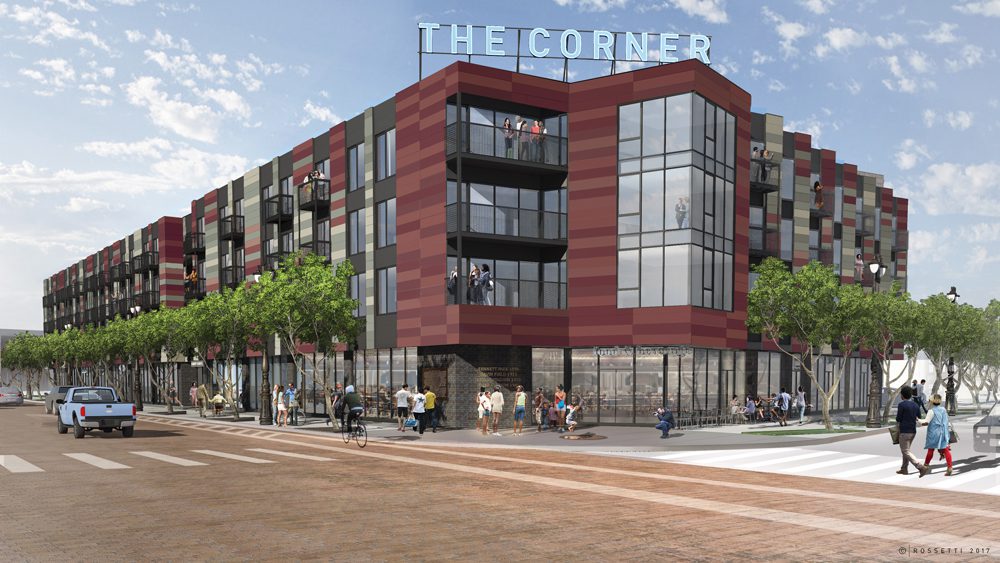

The $30-million, multiuse project at The Corner – also known as the former Detroit Tigers stadium site on Michigan Avenue in Detroit’s Corktown – posed a variety of challenges and opportunities for its developers and designers as they came up with a new vision for this unique site.
The opportunities were great: The property is in a highly desirable Detroit neighborhood, had huge community interest and a developer who wanted to think big about what should go on there. One idea, considered by the developer, Larson Realty Group, was to leverage innovations in modular project delivery.
ROSSETTI, a Detroit-based architectural design firm, was up for the challenge. The design team engaged with delivery practitioners to identify strategies for successful outcomes. As a result, the property has more than 100 modular units at its development, along with corner site-built units that take advantage of views at the intersection of Michigan and Trumbull, all complemented by a retail podium that adds to pedestrian street-level activity and vibrancy along the Michigan Avenue corridor.
Modular housing, already a big trend in Europe, is prefabricated living spaces that are built in a controlled environment to precise standards. It is starting to gain fans in the United States, but it had yet to be tried at a large scale in Detroit, officials said.
At The Corner, Michigan-based Champion Commercial Structures manufactured the units, which include studios, one-bedroom and two-bedroom units. The rest of the development at Michigan Avenue and Trumbull includes 26,000 square feet of retail, curated to include local Detroit businesses and amenities for residents and the Corktown community. Adjacent to The Corner is the Detroit Police Athletic League (PAL) headquarters and the Willie Horton Field of Dreams, a youth baseball field.
The project site formerly served as Tigers Stadium, but true baseball diehards will tell you that the baseball stadium has more than a century of history. When it opened about 100 years ago, it was known as Bennett Park, Navin Field and then Briggs Stadium. The stadium closed and the Tigers moved to Comerica Park on Woodward; the older building was demolished in 2009.
Deena Fox leads ROSSETTI’s multidisciplinary teams on design and planning projects of various scales, and oversees all project management for the firm. She values collaboration, so Fox was ready as a ROSSETTI Principal and Director of Project Leadership to see what The Corner could do for and in Detroit.
For ROSSETTI, Detroit and The Corner, modular housing turned out to be a great solution to the project’s needs, Fox said. The $30 million, mixed-use development posed one challenge in that the city wanted to see the site redeveloped, but both developer and design team felt a keen responsibility to balance the site’s storied legacy with its transformative potential for the future. The developer also wanted to see the development come online in a timely fashion to get it up and running for renters and small businesses.
“The developer was aware that there wasn’t anything else like this in the local market,” Fox said. “They were interested as we were in figuring out if this could work and be beneficial to the project.”
The site for the residential development was an unusual shape, like an angular puzzle piece, Fox said. They had to be thoughtful of what they’d put on the site to make sure it was both a creative and purposeful use of the available space. Plus, they wanted to take Detroit forward in terms of design and secure a beautiful and functional future.
“We need to think about both the future and the past in that part of Corktown, as well as in the city in general,” Fox said. “The goal was to honor the powerful intrinsic history of the site, but the project also had to fit well among future developments, relating thoughtfully to existing buildings along the corridor without necessarily emulating them.”
Fox said ROSSETTI would use modular units again on other projects as the situation allows. She said the benefits have been great, especially for The Corner. Allowing site work to continue while the units were under construction elsewhere kept the entire project moving forward, even in Michigan’s normally chilly winters.
The project, which is most of the way through construction after a spring 2018 groundbreaking, will be open and ready for residents sometime this summer.





